AAFP Global Health Workshop gains more international interest
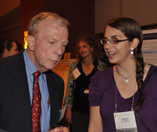
The American Academy of Family Physicians Center for International Health Initiatives (AAFP-CIHI) held its annual Family Medicine Global Health Workshop, in Minneapolis, September 6-8. The workshop demonstrated a constantly growing interest in global health among AAFP members: this year’s attendance increased by about 25%; the number of abstract submissions grew from 103 last year to 155 this year; students and residents’ participation noticeably increased as well. With the thematic byline Family Medicine: Educating and Caring for the World, the workshop gathered together family medicine educators, practicing family physicians, family medicine residents, medical students and health allied professionals with an undivided interest in global health. This year’s workshop again served as a forum for AAFP members and international participants to elaborate and reflect upon the growing importance of family medicine and primary care as foundational to global health.
Dr Dan Ostergaard, AAFP Vice President and WONCA North America Region President, in his welcoming remarks, pointed out that we in family medicine and other colleagues in primary care have multiple opportunities to improve care for the people of the world. It is our responsibility, he said, to educate each other and share our resources to do so. Dr Ostergaard thanked the CIHI Advisory Board and workshop educational chairs, Drs Cynthia Haq, Edward Shahady and Brian Jack for their enthusiasm, energy and professional input. He also extended his gratitude to the AAFP Foundation that has been supporting this important CME activity since 2005.
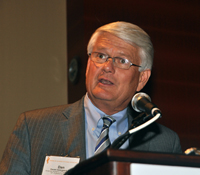 Dan Ostergaard MD, WONCA North America region president, greeting the workshop participants at the opening session.
Dan Ostergaard MD, WONCA North America region president, greeting the workshop participants at the opening session.
The workshop started with the key-note address from Prof Richard Roberts, WONCA President, who emphasized the fact that the nature of global health was changing shifting from communicable to chronic disease, from vertical programs to horizontal systems. These changes, said Prof Roberts, create extraordinary opportunities and challenges for primary care.
The workshop has been consistent in its growth and has become an educational and networking event of the year for family physicians and family medicine educators in the field of global health. This is the event that the AAFP has designed to be a connecting hub for globally-minded members to communicate, interact, network and learn from each other.
It was encouraging to hear that all of the participants found this continuing medical education activity valuable to AAFP members and their professional development. In their evaluations, many of the participants praised the workshop for its educational depth and variety, expertise of presenters and collegial atmosphere. The range of presentations covered topics that met interests of beginners in global health as well as seasoned international medicine experts. Those who are just making their first steps in their global health career realized that like any other worthwhile activity, “getting started” could be the most challenging step. Through specially designed workshops, they were provided with a “get started” framework to develop a vision and capacity for their global health activities and make them an integral part of their overall professional and personal life.
Learning from others through formal lectures and informal interactions has always been the direction we have taken at the workshop and especially when “others” are global health experts and educators with 25-30 years of successful experience in training and guiding young doctors to provide health care in a variety of international and intercultural settings. One of the sessions presented achievements and challenges of the US nation’s oldest family medicine residency track in global health. It generated an interactive discussion of critical principles and lessons learned in developing and maintaining successful programs at home and abroad.
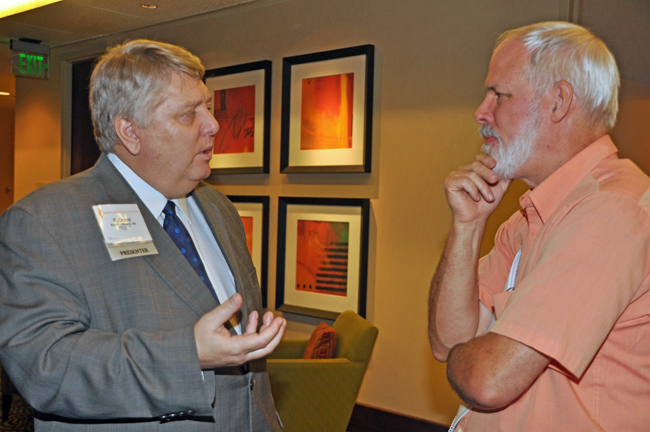 Photo: Dr Bruce Dahlman, a family physician from Minnesota who worked more than 15 years in Africa shares his observations with Prof Rich Roberts, WONCA President.
Photo: Dr Bruce Dahlman, a family physician from Minnesota who worked more than 15 years in Africa shares his observations with Prof Rich Roberts, WONCA President.
Participants enjoyed plenty of opportunities to meet their peers – physicians, residents, faculty and medical students with similar goals and interests, and learn from each other about what is going on around the world and how ideas and projects can be adapted or replicated in other countries and regions. The workshop program included the Networking Reception with Poster Presentations, “Meet the Global Health Mentor” Student/Resident Reception, facilitated discussion and networking groups on Africa and China and common interest lunches where participants could reconnect with old friends/colleagues, meet new ones, share and network.
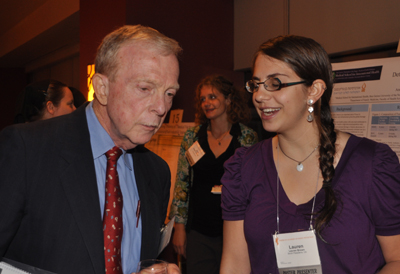 Photo: Lauren Brown, a medical student from California, talks about her research project with Dr Sam Matheny, Assistant Provost for Global Health Initiatives, University of Kentucky College of Medicine.
Photo: Lauren Brown, a medical student from California, talks about her research project with Dr Sam Matheny, Assistant Provost for Global Health Initiatives, University of Kentucky College of Medicine.
One of the educational goals of the workshop was to broaden participants’ clinical knowledge about diseases rarely encountered in their home country. The workshop encouraged submission of abstracts on global clinical issues and it resulted in highly evaluated talks on parasitology (Part I – Gastrointestinal, Part II – Tissue dwelling), tropical and HIV dermatology, malaria, global nutritional diseases, tropical medicine case studies and leprosy. There were numerous recommendations from the participants to organize a preconference on clinical topics which the workshop education committee will seriously consider for the 2013 AAFP Global Health Workshop in Baltimore.
It would take a long list to enlist all presentations made at the workshop. There were six plenary sessions, 36 breakout sessions, 48 peer sessions and 43 poster presentations. If interested, most of them can be accessed through the Family Medicine Digital Resource Library or the AAFP International Activities Office ([email protected]).
International participants
The 2012 workshop continued the initiative to increase the number of workshop attendees from resource-constrained countries started in 2010 and 2011. Interaction with international colleagues, especially from the countries and regions where AAFP members provide technical assistance in establishing and improving primary care, family medicine, human resources for health and medical education, was one of the highlights of the participant’s experience in Minneapolis. The workshop was attended by health professionals and family physicians from Albania, Brazil, Canada, Ecuador, Ethiopia, Iraq, Japan, Malawi, Nigeria, Pakistan and Vietnam. Such broad international participation contributed to the educational and networking value of the workshop and enhanced participants’ vision and understanding of what really works in global health.
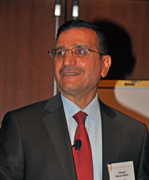 Dr Hassan Al-Kazzaz
Dr Hassan Al-Kazzaz
The workshop program received a tremendous boost from presentations from the representatives from all of the above countries. Three international participants were plenary speakers. Dr Hassan H B Al Kazzaz, Director General-Public Health Affairs from the Iraqi Ministry of Health, made a presentation on the role of family medicine in the quality and accessibility of health services, especially at the level of first contact with the health care system.
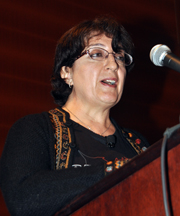
Dr Susan Alvear
Dr Susan Alvear, a family physician from Ecuador, in her plenary address raised important issues of ethics in global health. Her message strongly suggested that ethics can not only guide, but strengthen our program design, partnerships and global health efforts, in general. Development of personal and organizational ethics unifies the efforts that family physicians and teams are making throughout the world to address global health challenges, encourage engagement, advocacy and action.
Dr Pham Le An, Director of the Family Medicine Center, Ho Chi Minh City University of Medicine and Pharmacy, presented a remarkable story of the family medicine development in Vietnam. This story stands out as an example of persistency and collaboration between Vietnamese health authorities and US medical education centers, specifically Boston University and Maine Medical Center. It started in 1997 with a primary care needs assessment implemented by Drs Alain Montegut and Steve Cummings from the Division of International Health Improvement, Maine Medical Center at the request of the Ministry of Health of Vietnam. Based on their three-year study, they made a recomm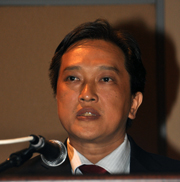 endation to the Vietnamese MOH to create educational programs that will lead to a specialty that will be the cornerstone for the delivery of primary health care to the people of Vietnam. This 15-year collaborative effort evolved from building initial relationships to the declaration of family medicine as an official specialty to the development family medicine residency programs in universities across the country to the advocacy for national policy to promote family medicine in primary care.
endation to the Vietnamese MOH to create educational programs that will lead to a specialty that will be the cornerstone for the delivery of primary health care to the people of Vietnam. This 15-year collaborative effort evolved from building initial relationships to the declaration of family medicine as an official specialty to the development family medicine residency programs in universities across the country to the advocacy for national policy to promote family medicine in primary care.
Dr Pham Le An
Other international presentations covered such topics as developing family medicine as an academic discipline in Malawi (Dr Luckson Dullie), progress and challenges of family medicine in Albania (Dr Valbona Iijazi), role of family physicians in providing continuity of care in Fukushima, Japan, a year after the Great East Japan Earthquake (Drs Keitaro Harasawa and Tadao Okada), Brazilian “paradox” (Dr Aldo Ciancio), a study on frequency and severity of depression and its contributing factors among mothers of children with cancer in a teaching hospital in Karachi, Pakistan (Dr Marian Ghufran).
The workshop was made possible thanks to the financial support from the AAFP Foundation.
The 2013 Family Medicine Global Health Workshop will be held in Baltimore, Maryland, USA, October 10-12, 2013. For information about the workshop registration, hotel accommodation and abstract submission please go to www.aafp.org/intl/workshop or contact Rebecca Janssen, Senior Program Coordinator.
More from the AAFP Assembly
WONCA North America meets during the AAFP Assembly in Philadelphia
AAFP members discuss international issues in Philadelphia